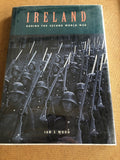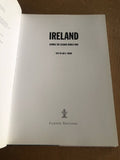Ireland During The Second World War by: Ian S. Wood
The claustrophobic years of the Second World War were a crucial watershed for neutral Ireland and the Irish. Neutrality was the key to Irish Prime Minister de Valera's foreign and domestic policy. Enforced economic hardship and isolation were seen by many as a blessing in disguise, hastening the new states coming of age. Many long lasting developments, such as the creation of a Central Bank signaled the beginning of the end of economic dependence on Britain. Neutrality ensured Britain, and more specifically Churchill, viewed Ireland with suspicion and barely concealed anger. Threats and inducements were used to persuade Ireland to allow the reoccupation of the Treaty Ports. Fear of IRA activity lead to increasingly draconian legislation. German spies were rumored to be forging links with an increasingly well-armed and militant IRA. Increased tension between Northern Ireland and the bombings of Belfast and Dublin raised questions about the viability of Ireland Neutrality. 2002
Condition: Good




